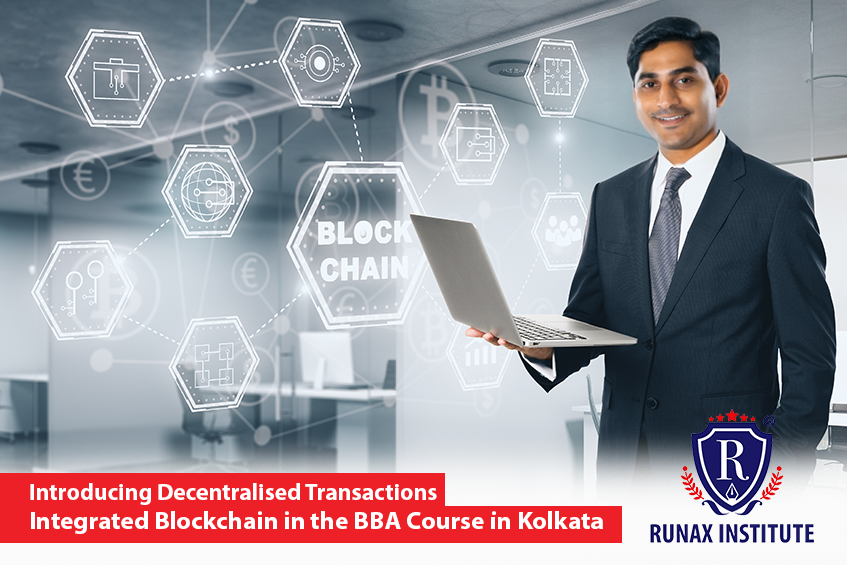Introduction
Let’s be honest. Traditional business management education often feels stuck in the 1990s. Students still memorise balance sheets, SWOT analysis charts, and textbook strategies that already look outdated in the real market. The problem? Companies today don’t just want managers who can calculate profits; they also want managers who can drive growth. They want professionals who can navigate digital transformation, tackle financial fraud, secure data, and innovate with cutting-edge technologies.
This is exactly where BBA Courses in Kolkata are stepping in with a radical upgrade: decentralised transactions integrated with blockchain.
Now, if you’re wondering why this matters, think about this—businesses today rely heavily on trust. Payments, supply chains, contracts, credentials—everything runs on trust. But what happens if the trust breaks? Fake invoices, forged degrees, supply-chain fraud, delayed vendor payments—the risks are endless. Without strong systems, managers face chaos and reputational disaster.
That’s why BBA Colleges in Kolkata are building a blockchain-enabled BBA curriculum where students don’t just learn about marketing, HR, and finance. They also dive into smart contract modules in the BBA course, decentralised transaction training in BBA, and blockchain use cases in the supply chain. Students run simulations, code DApps, and experiment with real-world projects.
If you keep reading, you’ll discover how Kolkata’s education ecosystem is turning management students into decentralised business architects. Instead of merely chasing jobs, they’re preparing to build secure, transparent, and future-proof business ecosystems.
Curriculum Integration: Embedding Blockchain Fundamentals into BBA Core
Gone are the days when BBA programs only revolved around management theories. Today, BBA courses in Kolkata are rewriting their academic blueprints. Subjects like Finance, Operations, and Business Law now include distributed ledger business modules, consensus mechanisms like Proof of Work and Proof of Stake, and practical exercises in tokenisation projects in a BBA course.
For example, in Finance classes, students don’t just study “cash flow.” They explore decentralised finance education (DeFi), learning how blockchain can reduce costs in international payments or provide transparent auditing. In Operations, they examine blockchain use cases in the supply chain, such as ensuring rice sourced from Bengal farms reaches warehouses without tampering. Business Law modules integrate smart contract deployment in business courses, teaching how automated agreements can eliminate disputes.
Case studies bring these theories to life. Students analyse blockchain-based credential verification in Kolkata, tokenised customer loyalty systems, and distributed auditing of vendor invoices. Professors design assignments where students build conceptual models for decentralised business models in the BBA course, ensuring every graduate is fluent in both profit margins and cryptographic trust mechanisms.
This overhaul ensures graduates aren’t just managers, they’re problem-solvers who understand blockchain’s impact on real-world business ecosystems.
Hands-On Labs: Building Smart Contracts & DApps on Ethereum
Theory is great, but without practice, it’s useless. That’s why leading BBA colleges in Kolkata are setting up BBA Blockchain Labs, spaces where students roll up their sleeves and actually code.
Here, students experiment with Ethereum DApp workshops in BBA, using tools like Solidity, Truffle, and Web3. They learn to design and deploy smart contracts, simulate decentralised transactions, and even test loyalty token systems. In one semester, a group may build a payment automation system for vendors, while another might create an audit trail app for small businesses.
Labs also host peer-review sessions and hackathons where students present projects and get feedback from both faculty and fintech mentors. Imagine a student team showcasing a tokenisation project where employees are rewarded with tokens instead of traditional perks. Or a project where supply chains become transparent using blockchain-powered QR codes.
This isn’t just coding for fun—it’s practical business architecture. By graduation, students have portfolios with working blockchain prototypes, making them market-ready for roles in consulting, fintech, and blockchain innovation across India.
Decentralised Use Cases: Supply Chain and Credential Verification
Blockchain education becomes powerful when tied to real-world problems. That’s why BBA courses in Kolkata spotlight India-specific challenges like supply chain transparency and tamper-proof academic credentials.
Take supply chains. A student project might track tea shipments from Assam farms to Kolkata warehouses using a distributed ledger business model. Every stage is recorded on-chain, visible to buyers, suppliers, and regulators. This reduces fraud, delays, and theft while boosting accountability.
Credentials are another game-changer. Instead of fragile paper degrees, universities are experimenting with a credential verification blockchain in Kolkata. Graduates could share QR-linked certificates, instantly verifiable worldwide. Students protect their professional integrity, and employers no longer squander weeks confirming authenticity.
Guest lectures by fintech startups give practical insights into building these systems. Students design prototypes for vendor logistics management, micropayments, and even blockchain-based alumni networks. By tackling high-impact, India-relevant scenarios, graduates become pioneers who bring trust, traceability, and efficiency into industries desperate for transparency.
Legal, Regulatory & Governance Mechanics in Indian Blockchain
Blockchain isn’t just about technology; it’s also about compliance. That’s why BBA blockchain education in Kolkata dedicates modules to regulatory blockchain governance in India.
Students learn about India’s evolving policies on cryptocurrency, tokenisation, and decentralised finance. Case studies about MeitY’s Vishvasya-Blockchain stack and the RBI’s digital rupee pilots are presented by the professors. Students explore questions like: Can businesses issue tokens legally? How does blockchain align with India’s KYC and AML laws?
Role-play scenarios make this engaging. One group acts as a fintech startup seeking compliance; another plays the regulator, drafting rules. Students also draft mock legal contracts based on smart contract deployment in business courses, learning how blockchain systems align with corporate law.
This method guarantees that graduates are knowledgeable about regulations in addition to technology. They emerge as professionals who can pitch blockchain innovation without ignoring compliance risks. Companies need this balance, and BBA graduates from Kolkata are learning to master it.
Industry Synergy: Internships, Workshops & Blockchain Ecosystems in Kolkata
The connection between classroom learning and industry application is stronger than ever. BBA colleges in Kolkata partner with fintech accelerators, blockchain startups, and research hubs to immerse students in real ecosystems.
For example, students attend events like the East-India Blockchain Summit hosted by IIT Kharagpur, where they network with blockchain leaders. They intern with SaaS vendors designing decentralised finance apps. They participate in workshops by NASSCOM FutureSkills or Algorand’s AlgoBharat, where they build prototypes alongside professionals.
Institutes also host pitch events where students present DApp concepts to investors. One batch pitched a blockchain-based supply chain solution for Bengal’s handloom industry. Another proposed a blockchain credential wallet for Kolkata universities.
This ecosystem ensures students graduate with real industry connections, mentorship, and confidence. It transforms them into innovation-ready professionals, not just freshers holding degrees.
Future Leaders: From BBA Graduates to Decentralised Business Architects
The final goal of this blockchain-enabled curriculum is transformation. Instead of producing traditional managers, BBA courses in Kolkata are shaping decentralised business architects.
Graduates now design blockchain-powered customer loyalty systems, token-based supply chains, and immutable compliance trackers. They can build businesses, overcome regulatory barriers with legislators, and present blockchain ideas to CEOs.
This isn’t just about learning code. It’s about cultivating strategic blockchain innovation, teaching students how to merge fintech-blockchain crossover in BBA with core management principles. Graduates build trustless business models, secure customer data, and integrate decentralised solutions into traditional companies.
In Kolkata’s competitive market, this makes them leaders, not followers. They’re ready to disrupt industries, create sustainable ecosystems, and redefine what business education means in the 21st century.
Conclusion
So here’s the takeaway: BBA courses in Kolkata are no longer limited to dusty textbooks or outdated case studies. By integrating blockchain, they’re building a new generation of professionals who can design secure, transparent, and decentralised business models.
Students aren’t just learning theories. They’re coding smart contracts, simulating vendor payments, experimenting with tokenisation, and engaging with fintech leaders. They graduate ready to handle supply chain transparency, secure academic credentials, regulatory frameworks, and industry-wide innovation.
The risk of ignoring blockchain in education? Producing managers are unprepared for decentralised finance, token economies, and transparent ecosystems. The value of embracing it? Future leaders who can architect the secure, efficient, and trustless business networks India desperately needs.
If you’re considering a BBA course in Kolkata, look for the ones integrating blockchain. Because in the next decade, the real leaders won’t just manage businesses, they’ll redesign them for a decentralised future.
Frequently Asked Questions
1. What makes BBA courses in Kolkata unique with blockchain integration?
They combine traditional management with blockchain modules like smart contracts, decentralised finance, and supply-chain projects, preparing students for future industries.
2. Do students learn coding in blockchain-enabled BBA courses?
Yes, students practice in labs, coding smart contracts and DApps using Ethereum tools, gaining practical hands-on experience.
3. How do blockchain internships benefit BBA students?
Internships with fintech startups and blockchain vendors expose students to live projects, mentorship, and real-world applications of their classroom learning.
4. Is blockchain education in BBA only about technology?
No. Students also study India’s regulatory environment, compliance rules, and governance, making them industry-ready professionals.
5. Can BBA graduates with blockchain expertise find jobs easily?
Absolutely. Companies value graduates skilled in blockchain for roles in fintech, supply chain, consulting, compliance, and decentralised finance innovation.






